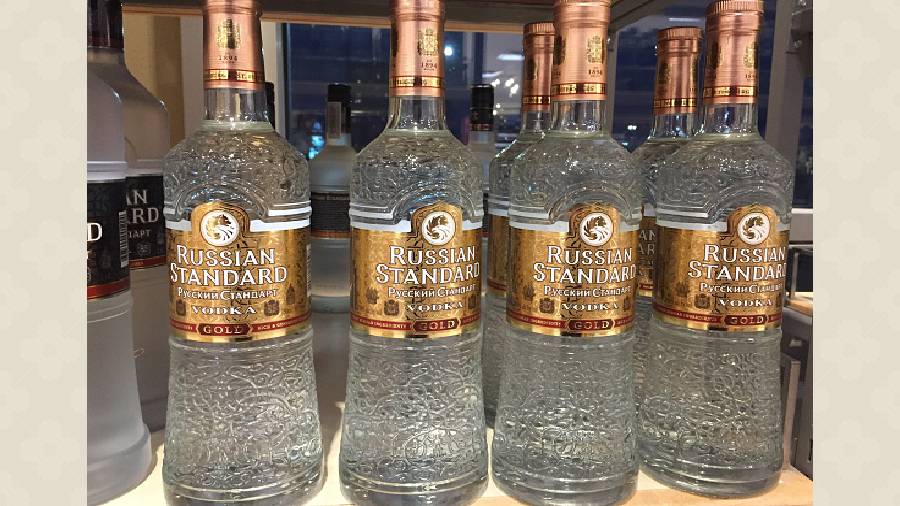Germany’s outrage at the invasion of Ukraine is growing as supermarkets banished Russian vodka from their shelves and the entire office staff of the former chancellor Gerhard Schroder quit in protest at his refusal to step down from lucrative posts in the Russian energy industry.
The retailers Rewe and Netto said they would stop selling all Russian-made products, including confectionery, ready meals and spirits. Aldi has dropped its only Russian brand, a vodka.
Schalke 04 football club ended its co-operation with its sponsor Gazprom, while the Russian chief conductor of the Munich Philharmonic, Valery Abisalovich Gergiev, was fired after failing to observe the mayor’s ultimatum to distance himself from President Putin.
Pressure was mounting on Schroder, long criticised for his roles as head of the board of directors of Nord Steam 2, the Baltic pipeline project that was put on hold indefinitely last week by Olaf Scholz, the chancellor, as well as chairman of the shareholders’ committee of Nord Stream and chairman of the Russian state oil company Rosneft.
Schroder once described Putin, with whom he began a friendship during his time in office from 1998 to 2005, as a “flawless democrat” and in January accused Ukraine of sabre-rattling while Russian troops massed along its border.
The invasion has also triggered calls for Scholz’s Social Democrats (SPD) to expel the former chancellor and for the government to stop funding his office, a privilege granted to all former chancellors. All four of his staff including a chauffeur walked out on Tuesday and asked to be reassigned to other jobs in the chancellery.
Schroder, who has not been seen in public in recent days, expressed rare criticism of Russia over its invasion in a statement last Thursday. However, he said that mistakes had been made “on both sides” and that Europe must ensure it did not cut its ties to Russia completely.
He has become an embarrassment to Scholz, who insisted during his visit to Moscow two weeks ago that “he speaks only for himself, not the government”, after Putin praised Schroder and said it was thanks to him that Germans’ gas bills were lower than elsewhere. There are also calls for Schroder to be stripped of the honorary citizenship of his home town of Hanover.
Attention has also fallen on the so-called Putin-Versteher (Putin sympathisers) in the ranks of the SPD, who have steadfastly called for dialogue with Russia in recent years.
They include the governor of the state of Mecklenburg-Western Pomerania, Manuela Schwesig, a strong supporter of Nord Stream 2 who set up a controversial state fund financed by Gazprom to support its completion.
Schwesig was accused by Andriy Melnyk the Ukrainian ambassador to Germany, of “hypocrisy” after she tweeted a photo of the state parliament lit up in the Ukrainian colours and the words “Solidarity with Ukraine”. He responded in a tweet: “The hypocrisy makes me want to vomit.”
The Russian invasion of Ukraine has within days transformed Germany’s quasi-pacifist foreign and security policy, with Scholz pledging a euros 100 billion injection for the country’s armed forces, so under-equipped after three decades of underfunding that troops now stationed in Lithuania have complained of a lack of underpants.
Christian Lindner, the finance minister and head of the Free Democrats, said that the Bundeswehr must become the most “effective fighting force in Europe”, talk that a few days ago would have been dismissed as far-Right waffle. Politicians have also revived talk of reintroducing military service, abandoned more than a decade ago.
Energy policy faces a seismic shift, with even the Greens willing to consider that nuclear power, due to be phased out by the end of this year, might need to be reviewed as part of a national effort to wean the economy off Russian gas, coal and oil.
Hungary has condemned the invasion of Ukraine and refrained from vetoing EU sanctions. However, Viktor Orban, the Prime Minister, is resisting actions that could threaten his close relations with Putin. Energy deals “must be left out of the sanctions issue, because otherwise we will pay the price of the war, and nobody wants that”, Orban said.
Oil reserves
The German government is releasing 434,000 tonnes of its national oil reserve, in line with an agreement by members of the International Energy Agency in response to the war in Ukraine.











